Basic principles of lesson planning
Basic principles of lesson planning
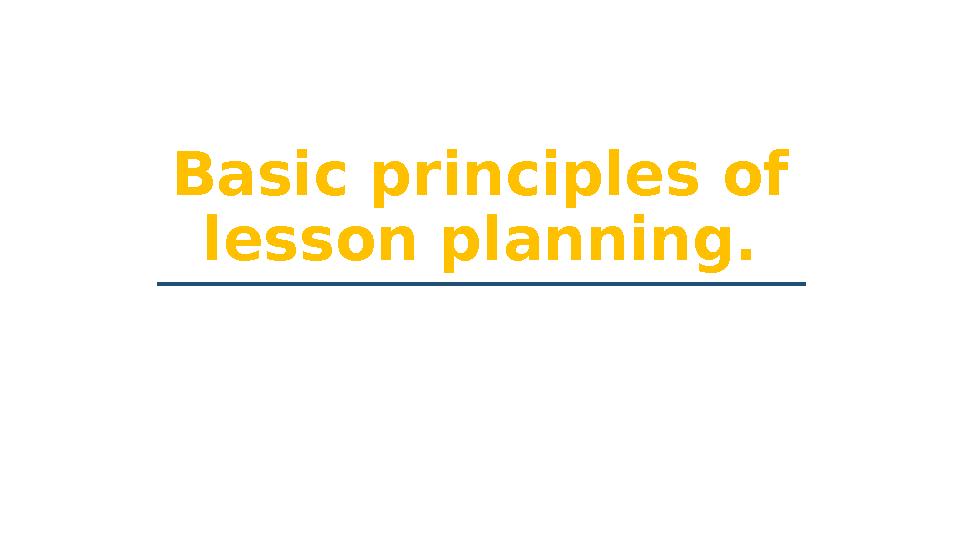

#1 слайд
Basic principles of
lesson planning.
1 слайд
Basic principles of lesson planning.
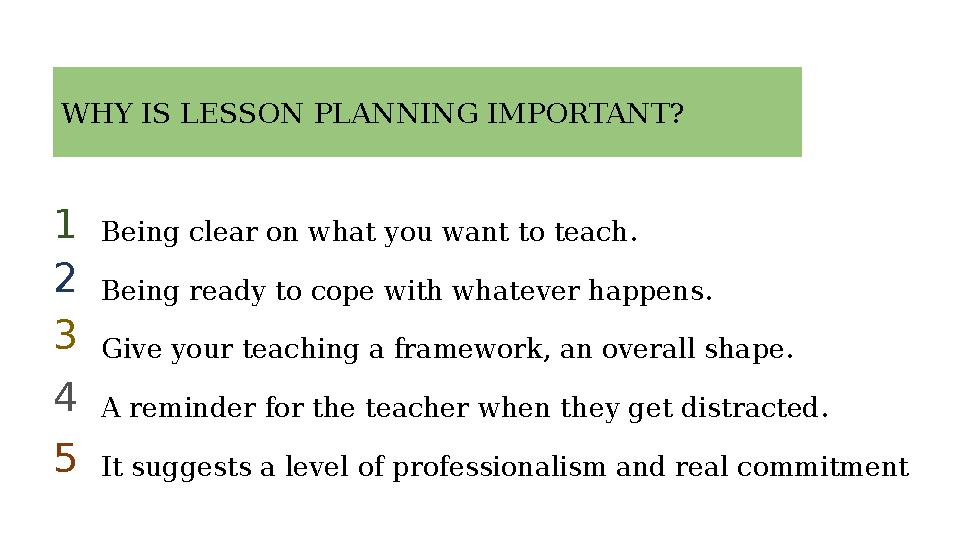
#2 слайд
Being clear on what you want to teach.
Being ready to cope with whatever happens.
Give your teaching a framework, an overall shape.
A reminder for the teacher when they get distracted.
It suggests a level of professionalism and real commitmentWHY IS LESSON PLANNING IMPORTANT?
1
2
3
4
5
2 слайд
Being clear on what you want to teach. Being ready to cope with whatever happens. Give your teaching a framework, an overall shape. A reminder for the teacher when they get distracted. It suggests a level of professionalism and real commitmentWHY IS LESSON PLANNING IMPORTANT? 1 2 3 4 5
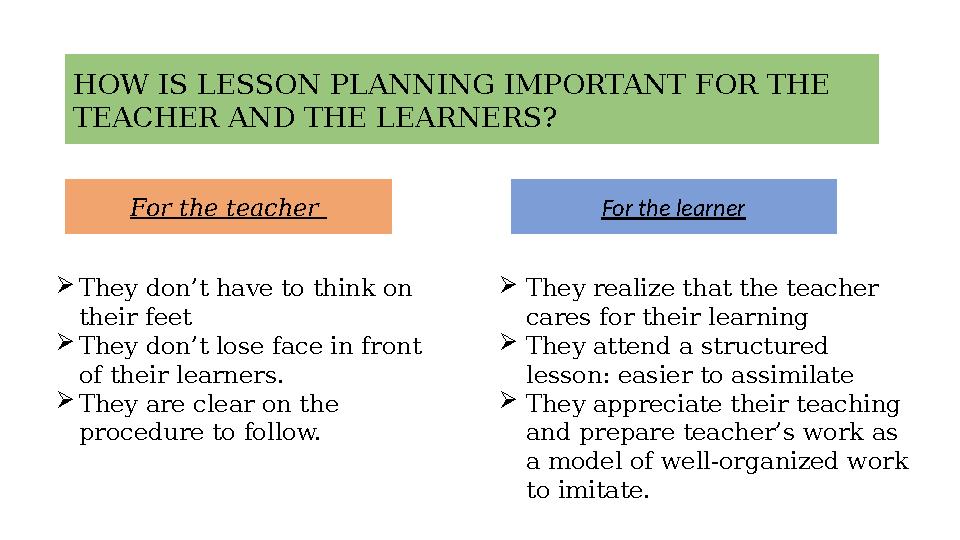
#3 слайд
HOW IS LESSON PLANNING IMPORTANT FOR THE
TEACHER AND THE LEARNERS?
For the teacher For the learner
They don’t have to think on
their feet
They don’t lose face in front
of their learners.
They are clear on the
procedure to follow.
They realize that the teacher
cares for their learning
They attend a structured
lesson: easier to assimilate
They appreciate their teaching
and prepare teacher’s work as
a model of well-organized work
to imitate.
3 слайд
HOW IS LESSON PLANNING IMPORTANT FOR THE TEACHER AND THE LEARNERS? For the teacher For the learner They don’t have to think on their feet They don’t lose face in front of their learners. They are clear on the procedure to follow. They realize that the teacher cares for their learning They attend a structured lesson: easier to assimilate They appreciate their teaching and prepare teacher’s work as a model of well-organized work to imitate.
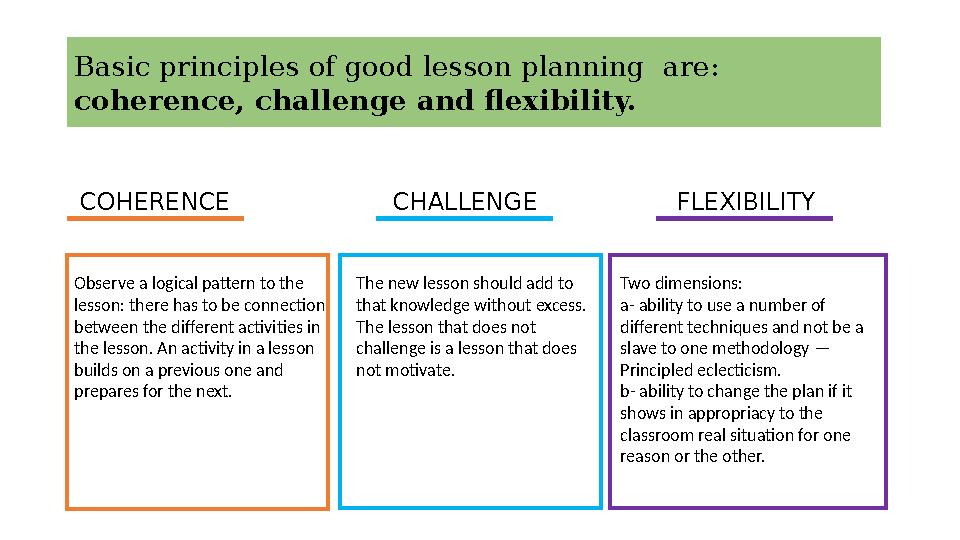
#4 слайд
Basic principles of good lesson planning are:
coherence, challenge and flexibility.
Observe a logical pattern to the
lesson: there has to be connection
between the different activities in
the lesson. An activity in a lesson
builds on a previous one and
prepares for the next. COHERENCE CHALLENGE
The new lesson should add to
that knowledge without excess.
The lesson that does not
challenge is a lesson that does
not motivate. FLEXIBILITY
Two dimensions:
a- ability to use a number of
different techniques and not be a
slave to one methodology —
Principled eclecticism.
b- ability to change the plan if it
shows in appropriacy to the
classroom real situation for one
reason or the other.
4 слайд
Basic principles of good lesson planning are: coherence, challenge and flexibility. Observe a logical pattern to the lesson: there has to be connection between the different activities in the lesson. An activity in a lesson builds on a previous one and prepares for the next. COHERENCE CHALLENGE The new lesson should add to that knowledge without excess. The lesson that does not challenge is a lesson that does not motivate. FLEXIBILITY Two dimensions: a- ability to use a number of different techniques and not be a slave to one methodology — Principled eclecticism. b- ability to change the plan if it shows in appropriacy to the classroom real situation for one reason or the other.
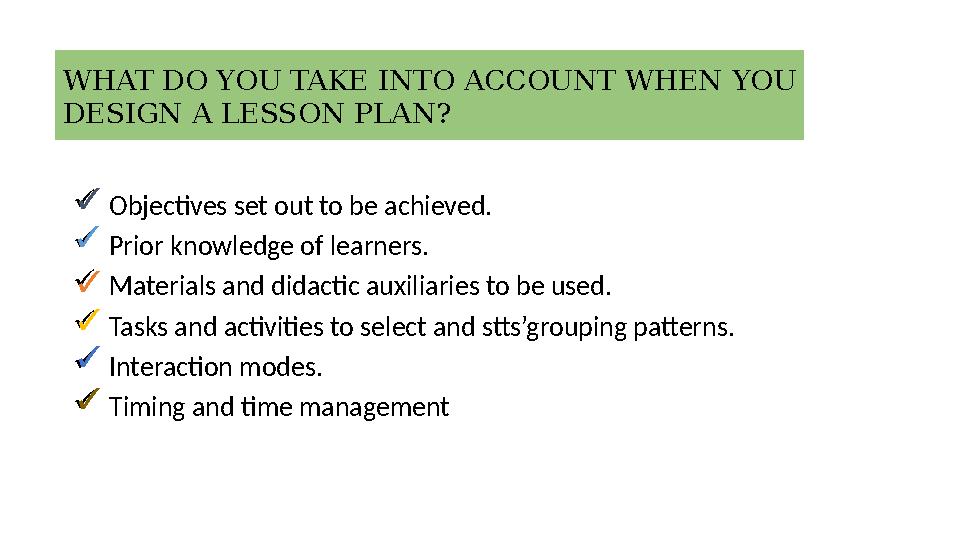
#5 слайд
Objectives set out to be achieved.
Prior knowledge of learners.
Materials and didactic auxiliaries to be used.
Tasks and activities to select and stts’grouping patterns.
Interaction modes.
Timing and time managementWHAT DO YOU TAKE INTO ACCOUNT WHEN YOU
DESIGN A LESSON PLAN?
✓
✓
✓
✓
✓
✓
5 слайд
Objectives set out to be achieved. Prior knowledge of learners. Materials and didactic auxiliaries to be used. Tasks and activities to select and stts’grouping patterns. Interaction modes. Timing and time managementWHAT DO YOU TAKE INTO ACCOUNT WHEN YOU DESIGN A LESSON PLAN? ✓ ✓ ✓ ✓ ✓ ✓

шағым қалдыра аласыз
















